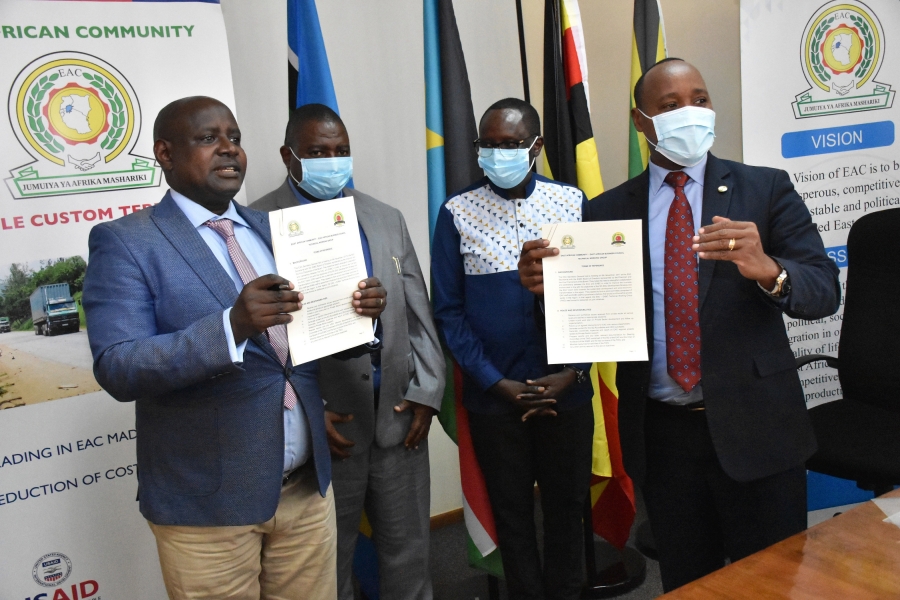
EAC and EABC launch Technical Working Group to promote Private Sector Development
East African Community Headquarters, Arusha, Tanzania, 8th July, 2021: The East African Community and the East African Business Council (EABC), the umbrella body bringing together private sector associations in East Africa, today launched the EAC-EABC Technical Working Group at the EAC Headquarters in Arusha, Tanzania.
The EAC-EABC Technical Working Group (TWG) that draws its membership from EAC and EABC is meant to spearhead initiatives that will benefit the private sector in East Africa. The EAC Director General for Customs and Trade, Mr. Kenneth Bagamuhunda, will chair the TWG.
Speaking at the launch of the TWG, EAC Secretary General Hon. (Dr.) Peter Mathuki said that EAC-EABC TWG has a specific mandate to promote activities that will raise the visibility of the EAC in addition to providing a platform for addressing concerns raised by the business community in the region.
Dr. Mathuki urged the TWG to reach out to every businessperson, whether large or small, by putting in place a hotline for receiving issues raised by stakeholders, adding that the EAC’s focus would henceforth be placing the private sector at the heart of the integration process as outlined in the Treaty for the Establishment of the EAC.
The SG emphasised that teamwork and ownership would be crucial to the success of the TWG, which should be results-oriented.
“We are on the threshold of a new dawn that will take the Community to the people. Whatever we do, it must result into something tangible,” said Dr. Mathuki, adding that the first three stages of the EAC integration, namely the Customs Union, Common Market and Monetary Union were meant to promote economic integration in the region.
Dr. Mathuki said that only a cohesive and organised private sector in East Africa would be in position to take advantage of the business opportunities that would come with the implementation of the African Continental Free Trade Area (AfCFTA).
“The TWG should come up with a harmonised framework for a collective response by Partner States to COVID-19 in the region. A collective response in the region will guarantee economic recovery in a post-COVID era,” said the Secretary General.
In his remarks, East African Legislative Assembly (EALA) Speaker Hon. Ngoga Martin said the private sector was taking its rightful place in regional integration through the signing of the TWG.
“We have an obligation under the Treaty as EAC leaders to strengthen the role of the private sector in the integration process. I am afraid that so far, we haven’t fulfilled this obligation as required of us,” said Hon. Ngoga, adding that EALA’s mandate was to provide the legal framework to actualize the aspirations of the people of East Africa.
Hon. Ngoga said that EALA works through its six standing committees but called on the EABC to work with all the committees because private sector is a cost cutting phenomenon.
“The private sector through EABC should work closely with the Assembly to ensure that the necessary legal framework is put in place to facilitate the development of the private sector in East Africa,” said Hon. Ngoga, adding that the partnership between EAC and EABC would take the integration process to the next level.
On his part, EABC Executive Director John Bosco Kalisa said the TWG would identify issues that hinder the free movement of goods in the region and have them resolved on a monthly basis.
Mr. Kalisa said that in addition to identifying the issues impeding intra-EAC trade, the TWG should come up with solutions instead of always waiting for the Council and Summit to resolve such matters.
The EABC CEO hailed EALA for putting in place the necessary legal framework to address Non-tariff Barriers (NTBs) through the NTBs Act, 2017.
Among the TWG’s roles and responsibilities are: to receive and synthesize issues received from private sector at various levels and advise on appropriate solutions; create a joint work plan on Private Sector development and follow up implementation; follow up on agreed interventions for EAC with various stakeholders; generate content for the SG Roundtable and CEO roundtable; generate, coordinate, supervise and report on EAC regional projects related to Private Sector support.
TWG’s other roles are to: prepare reports and any other relevant documentation for Steering Committee of the TWG comprised of the SG of the EAC and the Chair of the Board of the EABC and the two co-chairs of the TWG; mobilize resources for activities of the TWG, and; any other activity relevant to the above objectives.
For more information, please contact:
Simon Peter Owaka
Senior Public Relations Officer
Corporate Communications and Public Affairs Department
EAC Secretariat
Arusha, Tanzania
Tel: +255 768 552087
Email: sowaka [at] eachq.org
About the East African Community Secretariat:
The East African Community (EAC) is a regional intergovernmental organisation of six Partner States, comprising Burundi, Kenya, Rwanda, South Sudan, Tanzania and Uganda, with its headquarters in Arusha, Tanzania.
The EAC Secretariat is ISO 9001: 2015 Certified
